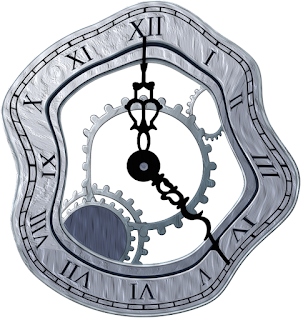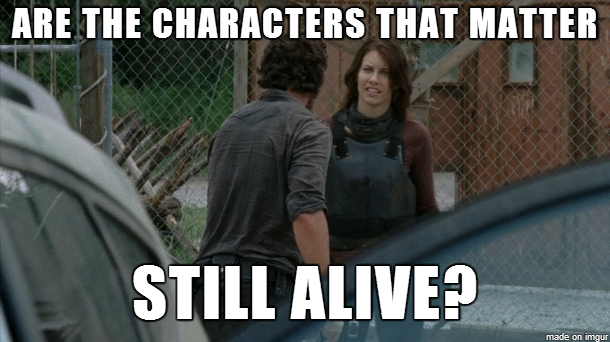How Role-Playing Games Make You a Better Writer
It's probably not the reason you're thinking.
Full disclosure: My debut novel is now available as an eBook on Amazon. The following is a description of a gaming trick that worked for me, that helped me to develop better stories. You may not find the same thing to be true, and you may completely disagree with me and think I'm full of shit. That's okay. I respect your right to be wrong.
When most young writers start playing role-playing games, especially Game-Mastering, they fall into a very common trap (I know I did) - they write their story and expect the other players/PCs to follow through it. The would-be writer doesn't want the players to be active members of the narrative - they want the party to stumble through his detailed adventure/novel, hitting HIS beats and telling the stories the way HE wants them told.
How do you know your GM is one of those who just runs you through the script of his novels? The following are pretty obvious tells:
"You can't do that!"
"You're not supposed to do it that way!"
"That's not what I had planned!"
I know I've probably said all of those things at one point or another (though hopefully not recently). They are not really the sign of someone who didn't prepare enough so much as somehow who prepared too much - and really wants to make certain he gets all his shit in.
So yeah, you can write a novel, plop your players into it and slog through it, but that doesn't make you a better writer, and makes you a downright shitty GM. So what the hell am I talking about?
The best part of any role-playing game is the unexpected part(s). The players will come up with stuff you didn't plan for, and you often have to improvise to keep the story going. One of the players kills the big villain in cold blood half-way through the adventure. One of the player characters kills another player character out of the blue but actually makes perfect sense in retrospect. One of the players randomly declares he's another character's brother, even though (unbeknownst to the player), the character is a Cylon. Someone says something really stupid. These create wrinkles that make the game memorable. These are the moments you talk about for years to come, especially if you work them into the mythos of the campaign and they become canon.
You know what are also the best parts of many works of fiction? The unexpected parts. So many books, especially genre fiction, are pretty paint-by-numbers, and you can see every twist and turn of the plot coming a mile away. When something surprises you, hits you right in the feels, it makes that memorable mark on you the same way a surprise moment in a game does.
Take for instance A Game of Thrones (I hear it's pretty popular these days). At the end of the book *SPOILER* a major character dies rather suddenly and unexpectedly (though upon further re-reads he totally deserves it). It was a defining moment in the series that sets it apart from other fantasy series: anything can and will happen in these books.
You know how that scene played out in Martin's D&D game the night before he wrote it?
Player One (playing Ned): Okay, so we've got a plan? I'm going to go to the Wall, raise an army, then come back to protect King's Landing.
Player Two (playing Cersei): Perfect! I'll hold down the fort and stir up distrust against the Targaryans. We want the people on our side when the bitch with the dragons comes back.
Player Three (playing Joffrey): OFF WITH HIS HEAD!
Player One and Two: WHAT THE FUCK ARE YOU DOING?
Player Three: I'm the king now. I can do whatever the hell I want!
Player One: But you... but we...
Martin (as Game Master): *rolls* He makes his command check. The headsman nods and attacks Ned with Ice, which is +4 to hit and automatically decapitates on a 19 or better... *rolls* NATURAL TWENTY!
Player One: FUCK! I was level 12, you fucking bastard!
You know that's exactly how it went down.
Those are the kinds of moments you want to embrace. Those are the feelings of shock, awe and wonder you want in your writing. You don't necessarily have to kill off characters to get it (though that is the quick and easy way). But don't be afraid to add weird, interesting things for the sake of throwing in weird and interesting things.
Some people plot their novels to death, outlining every scene, every line in advance so they know exactly what will happen. This certainly has a place, but you also need to have room to explore and be creative and let unexpected things happen.
There are lots of weird things in my book, Ten Thousand Days. It starts off (after the prologue, anyway) as a very normal, real-world story. There's a few brief flutters of oddness but it stays fairly grounded until the weirdness grows more and more frequent. At the half-way mark reality goes out the window and we enter completely into a surreal fantasy world. Some of the oddness in the first part foreshadows this, some of is doesn't. There are a lot of odd goings-on in the second half that I throw out there but never really explain, and that was very much on purpose. The main character doesn't understand what's going on around him, and neither should the reader. They should experience the same unnerving sense of wrongness as our hero. When he does find something that makes sense that he can latch onto, it becomes important to him and he needs this thread of reality to keep him going, so I explain it more for the reader as well.
Basically he has his quest/adventure laid out, but there are lots of bits of set dressing thrown on top. This is the same as the fluff the GM adds to his game, or the stupid shit the players make up to entertain themselves. It doesn't always make sense right away, but it becomes part of your world and if you embrace it, it creates the best memories.
How do role-playing games affect your writing? Or your enjoyment in reading, for that matter? Do you read books and watch movies and automatically view them through the filter of an RPG?
My debut novel, Ten Thousand Days, is now available as an eBook on Amazon sites worldwide as well as Kobobooks.
Full disclosure: My debut novel is now available as an eBook on Amazon. The following is a description of a gaming trick that worked for me, that helped me to develop better stories. You may not find the same thing to be true, and you may completely disagree with me and think I'm full of shit. That's okay. I respect your right to be wrong.
When most young writers start playing role-playing games, especially Game-Mastering, they fall into a very common trap (I know I did) - they write their story and expect the other players/PCs to follow through it. The would-be writer doesn't want the players to be active members of the narrative - they want the party to stumble through his detailed adventure/novel, hitting HIS beats and telling the stories the way HE wants them told.
How do you know your GM is one of those who just runs you through the script of his novels? The following are pretty obvious tells:
"You can't do that!"
"You're not supposed to do it that way!"
"That's not what I had planned!"
I know I've probably said all of those things at one point or another (though hopefully not recently). They are not really the sign of someone who didn't prepare enough so much as somehow who prepared too much - and really wants to make certain he gets all his shit in.
So yeah, you can write a novel, plop your players into it and slog through it, but that doesn't make you a better writer, and makes you a downright shitty GM. So what the hell am I talking about?
 |
| For reference, this is too many notes for your novel OR your D&D adventure. |
You know what are also the best parts of many works of fiction? The unexpected parts. So many books, especially genre fiction, are pretty paint-by-numbers, and you can see every twist and turn of the plot coming a mile away. When something surprises you, hits you right in the feels, it makes that memorable mark on you the same way a surprise moment in a game does.
 |
| Bit of advice: Don't surprise a wookiee during a game of Monopoly. |
You know how that scene played out in Martin's D&D game the night before he wrote it?
Player One (playing Ned): Okay, so we've got a plan? I'm going to go to the Wall, raise an army, then come back to protect King's Landing.
Player Two (playing Cersei): Perfect! I'll hold down the fort and stir up distrust against the Targaryans. We want the people on our side when the bitch with the dragons comes back.
Player Three (playing Joffrey): OFF WITH HIS HEAD!
Player One and Two: WHAT THE FUCK ARE YOU DOING?
Player Three: I'm the king now. I can do whatever the hell I want!
Player One: But you... but we...
Martin (as Game Master): *rolls* He makes his command check. The headsman nods and attacks Ned with Ice, which is +4 to hit and automatically decapitates on a 19 or better... *rolls* NATURAL TWENTY!
Player One: FUCK! I was level 12, you fucking bastard!
You know that's exactly how it went down.
 |
| Pictured: Your little brother's character in like, every game. Ever. |
Some people plot their novels to death, outlining every scene, every line in advance so they know exactly what will happen. This certainly has a place, but you also need to have room to explore and be creative and let unexpected things happen.
There are lots of weird things in my book, Ten Thousand Days. It starts off (after the prologue, anyway) as a very normal, real-world story. There's a few brief flutters of oddness but it stays fairly grounded until the weirdness grows more and more frequent. At the half-way mark reality goes out the window and we enter completely into a surreal fantasy world. Some of the oddness in the first part foreshadows this, some of is doesn't. There are a lot of odd goings-on in the second half that I throw out there but never really explain, and that was very much on purpose. The main character doesn't understand what's going on around him, and neither should the reader. They should experience the same unnerving sense of wrongness as our hero. When he does find something that makes sense that he can latch onto, it becomes important to him and he needs this thread of reality to keep him going, so I explain it more for the reader as well.
Basically he has his quest/adventure laid out, but there are lots of bits of set dressing thrown on top. This is the same as the fluff the GM adds to his game, or the stupid shit the players make up to entertain themselves. It doesn't always make sense right away, but it becomes part of your world and if you embrace it, it creates the best memories.
How do role-playing games affect your writing? Or your enjoyment in reading, for that matter? Do you read books and watch movies and automatically view them through the filter of an RPG?
My debut novel, Ten Thousand Days, is now available as an eBook on Amazon sites worldwide as well as Kobobooks.










Comments
Post a Comment
Thanks for commenting at Rule of the Dice.